#AI-generated Music
Text
Artificial Intelligence Revolutionizes the Music World: The Case of "Neural Notes Revolution"
Artificial intelligence (AI) is rapidly transforming our world, permeating sectors from healthcare to industry, education to transportation. This technology, which aims to replicate and surpass human cognitive abilities, promises to revolutionize the way we live and work.
The applications of AI are numerous and ever-expanding: from medical diagnosis to autonomous driving, data analysis to content creation. A particularly intriguing field is music, where AI is demonstrating remarkable potential.
Recently, there has been much discussion about AI-based music generation platforms like "Suno" and "Udio," accused of violating numerous artists' copyrights to train their algorithms. These controversies highlight the complex ethical and legal issues that AI raises in the artistic field.
In this context, the Italian project "Neural Notes Revolution" emerges, demonstrating how, with the aid of AI programs, the study of algorithms suitable for targeted generation of musical styles, voices, song structures, and with adequate post-processing, it's possible to produce musical pieces of any genre and style, in any language, in relatively short timeframes.
The project also leverages other generative AI platforms such as OpenAI's ChatGPT (Microsoft group, of which Elon Musk was a co-founder), Anthropic's Claude AI, and Google's Gemini. These technologies allow for the generation of texts, both original and based on precise or imaginative prompts, in numerous languages, even using expressions typical of specific localities and dialects.
However, "Neural Notes Revolution" still faces some challenges. The results provided by ChatBOTs require careful verification, and in the music field, generation platforms have significant limitations. In particular, "Suno" and "Udio" lack a precise and rigorous syntax that allows for accurate results. Often, the outcomes are even opposite to those desired, forcing a trial-and-error approach. One of the major limitations is the near-total impossibility of having clear style changes within the same song.
Expected future developments include the ability to modify produced songs in a targeted manner. It would be useful to have separate files for the vocal part, the musical backing, and the lyrics in subtitle format. Moreover, there's hope to be able to modify individual parts of text or music, and above all, to have a correct and rigorously respected syntax for the song structure and use of styles.
The use of these platforms raises several issues. On one hand, they offer new creative possibilities and democratize music production. On the other, they raise concerns about copyright, artistic authenticity, and the future of work in the music industry.
In conclusion, while giving space to creativity, we are still far from competing with the styles, voices, and tones of artists of all time. However, in defense of the "new artists" of the AI era, it must be recognized that creativity and skill are still necessary to produce musical pieces of a certain depth. This is particularly relevant in a modern musical landscape that often offers music devoid of artistic and cultural significance. AI in music thus represents both a challenge and an opportunity, requiring a balance between technological innovation and preservation of human artistic expression.
#neuralnotesrevolution#ai#Artificial Intelligence#AI and Music#AI Music Generation#AI-Generated Music#Musical Algorithms#Digital Music#Musical Innovation#Music Technology#Automated Composition#Artificial Creativity#AI Music Production#Future Music#AI in Music#Music and Technology#AI Musical Instruments#AI-Assisted Composition#AI Music Software#Neural Networks and Music#AI in Music Industry#AI Music Innovations
2 notes
·
View notes
Text
We embrace AI-generated music as an exciting and innovative Tool for artistic expression. Much like when calculators, computers or smartphones were introduced. Visit our channel at: https://www.youtube.com/@aidanceparty
#ai dance party#ai music#latest ai music#latest arabic music#latest arabic ai music#club ai music#belly dance#belly dancer#AI Dance Music#AI Music#AI-Generated Music#AI Dance Tracks#Electronic Dance Music#AI Music Production#Futuristic Dance Music#Dance Music Videos#AI Music Videos#AI Beats#AI Dance Beats#AI Club Music#AI Electronic Beats#AI DJ Mixes#AI Party Music
2 notes
·
View notes
Text
youtube
🎶 "In My Heart" - An AI-Crafted Love Song | Lyrics by Upul Udayaraj Jayasinghe 🌸💖 ✨ Welcome to a mesmerizing journey of love and emotions with the song "In My Heart." This enchanting melody, crafted with lyrics by Upul Udayaraj Jayasinghe and music generated by AI, brings together the beauty of human creativity and the power of artificial intelligence. 🌟 🎤 Song Breakdown: Verse 1: Takes you into a world where memories and love are crystal clear, where affection fills every moment. 💫 Chorus: A reminder that love is ever-present, free like the wind, guiding you through the darkest nights and brightest mornings. 🌙🌞 Verse 2: A call to closeness, with love being the constant companion in life’s journey, even across distances. 🌊💑 Bridge: A poetic reflection of how love was destined, carried by fate like a star shining through the skies. 🌠 Verse 3: Through life’s storms and challenges, love stands as a beacon of hope, always true and unwavering. 🌹🌧️ 🎶 This heartfelt love song captures the essence of deep connection, devotion, and the beauty of eternal love. With delicate verses and a soothing melody, "In My Heart" is sure to tug at your heartstrings. Whether you’re reflecting on a love that transcends time and space or simply looking for a song that speaks to the soul, this is for you. 🌺✨ 🔔 Don’t forget to like, comment, and subscribe to stay updated with more AI-powered musical creations and lyrical wonders from Upul Udayaraj Jayasinghe!
#AI-generated music#love song#romantic music#emotional song#lyrics by Upul Udayaraj Jayasinghe#AI music#love lyrics#soulful music#AI-powered song#new AI music#heartfelt lyrics#in my heart song#love melody#emotional lyrics#2024 love song#music by AI#love song lyrics#artificial intelligence music#music creation AI#AI love song#Upul Udayaraj Jayasinghe#ai music#ai music video#artificial intelligence#@365life6#youtube#Youtube
1 note
·
View note
Text
The Meteoric Rise of Generative AI Music
(Image generated by author with BlueWillow)
In our previous post, we explored the transformative power of generative AI in the art industry. We saw how AI can be used to create stunning and innovative artworks. In this post, we will shift our focus to the music industry. With more than 14 million songs created (14% of the world’s music recordings) by just one platform under three years,…

View On WordPress
#AI#AI Music Generator#AI-generated Music#Algorithmic music#Computer-generated music#Generative AI Music#Music Industry#Streaming Platforms
0 notes
Text
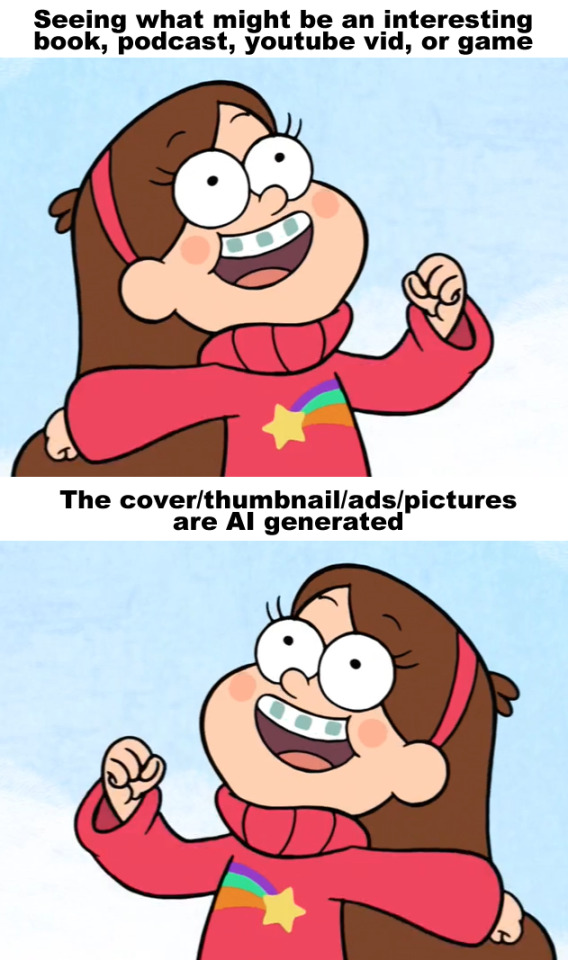
dusting off the ol' running Mabel meme after all these years because i am Tired
#gravity falls#fuck gen ai#if you cant be arsed to care about your own thing then neither can i :B#same goes for generated music and voices too that shit is disappointing#'wow who's voice is this?' guess i'll never know bc heckin ursula over here decided to steal it via non-crediting contraption
1K notes
·
View notes
Text
#video#paradise#view#nature#paraiso#natureza#explore#travel#trip#home garden#house goals#raining#rainymood#gazebo#garden#ai generated#flowers#trees#rainyday#peace#landscape#music#relaxing
704 notes
·
View notes
Text
Neither the devil you know nor the devil you don’t
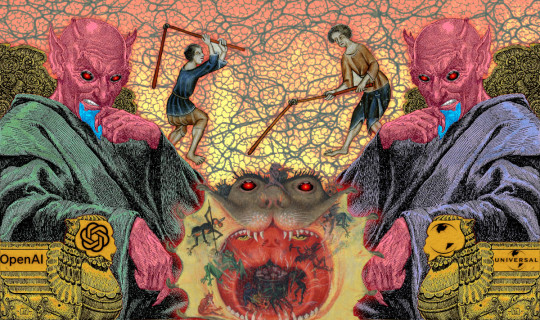
TONIGHT (June 21) I'm doing an ONLINE READING for the LOCUS AWARDS at 16hPT. On SATURDAY (June 22) I'll be in OAKLAND, CA for a panel (13hPT) and a keynote (18hPT) at the LOCUS AWARDS.

Spotify's relationship to artists can be kind of confusing. On the one hand, they pay a laughably low per-stream rate, as in homeopathic residues of a penny. On the other hand, the Big Three labels get a fortune from Spotify. And on the other other hand, it makes sense that rate for a stream heard by one person should be less than the rate for a song broadcast to thousands or millions of listeners.
But the whole thing makes sense once you understand the corporate history of Spotify. There's a whole chapter about this in Rebecca Giblin's and my 2022 book, Chokepoint Capitalism; we even made the audio for it a "Spotify exclusive" (it's the only part of the audiobook you can hear on Spotify, natch):
https://pluralistic.net/2022/09/12/streaming-doesnt-pay/#stunt-publishing
Unlike online music predecessors like Napster, Spotify sought licenses from the labels for the music it made available. This gave those labels a lot of power over Spotify, but not all the labels, just three of them. Universal, Warner and Sony, the Big Three, control more than 70% of all music recordings, and more than 60% of all music compositions. These three companies are remarkably inbred. Their execs routine hop from one to the other, and they regularly cross-license samples and other rights to each other.
The Big Three told Spotify that the price of licensing their catalogs would be high. First of all, Spotify had to give significant ownership stakes to all three labels. This put the labels in an unresolvable conflict of interest: as owners of Spotify, it was in their interests for licensing payments for music to be as low as possible. But as labels representing creative workers – musicians – it was in their interests for these payments to be as high as possible.
As it turns out, it wasn't hard to resolve that conflict after all. You see, the money the Big Three got in the form of dividends, stock sales, etc was theirs to spend as they saw fit. They could share some, all, or none of it with musicians. Big the Big Three's contracts with musicians gave those workers a guaranteed share of Spotify's licensing payments.
Accordingly, the Big Three demanded those rock-bottom per-stream rates that Spotify is notorious for. Yeah, it's true that a streaming per-listener payment should be lower than a radio per-play payment (which reaches thousands or millions of listeners), but even accounting for that, the math doesn't add up. Multiply the per-listener stream rate by the number of listeners for, say, a typical satellite radio cast, and Spotify is clearly getting a massive discount relative to other services that didn't make the Big Three into co-owners when they were kicking off.
But there's still something awry: the Big Three take in gigantic fortunes from Spotify in licensing payments. How can the per-stream rate be so low but the licensing payments be so large? And why are artists seeing so little?
Again, it's not hard to understand once you see the structure of Spotify's deal with the Big Three. The Big Three are each guaranteed a monthly minimum payment, irrespective of the number of Spotify streams from their catalog that month. So Sony might be guaranteed, say, $30m a month from Spotify, but the ultra-low per-stream rate Sony insisted on means that all the Sony streams in a typical month add up to $10m. That means that Sony still gets $30m from Spotify, but only $10m is "attributable" to a specific recording artist who can make a claim on it. The rest of the money is Sony's to play with: they can spread it around all their artists, some of their artists, or none of their artists. They can spend it on "artist development" (which might mean sending top execs on luxury junkets to big music festivals). It's theirs. The lower the per-stream rate is, the more of that minimum monthly payment is unattributable, meaning that Sony can line its pockets with it.
But these monthly minimums are just part of the goodies that the Big Three negotiated for themselves when they were designing Spotify. They also get free promo, advertising, and inclusion on Spotify's top playlists. Best (worst!) of all, the Big Three have "most favored nation" status, which means that every other label – the indies that rep the 30% of music not controlled by the Big Three – have to eat shit and take the ultra-low per-stream rate. Only those indies don't get billions in stock, they don't get monthly minimum guarantees, and they have to pay for promo, advertising, and inclusion on hot playlists.
When you understand the business mechanics of Spotify, all the contradictions resolve themselves. It is simultaneously true that Spotify pays a very low per-stream rate, that it pays the Big Three labels gigantic sums every month, and that artists are grotesquely underpaid by this system.
There are many lessons to take from this little scam, but for me, the top takeaway here is that artists are the class enemies of both Big Tech and Big Content. The Napster Wars demanded that artists ally themselves with either the tech sector or the entertainment center, nominating one or the other to be their champion.
But for a creative worker, it doesn't matter who makes a meal out of you, tech or content – all that matters is that you're being devoured.
This brings me to the debate over training AI and copyright. A lot of creative workers are justifiably angry and afraid that the AI companies want to destroy creative jobs. The CTO of Openai literally just said that onstage: "Some creative jobs maybe will go away, but maybe they shouldn’t have been there in the first place":
https://bgr.com/tech/openai-cto-thinks-ai-will-kill-some-jobs-that-shouldnt-have-existed-in-the-first-place/
Many of these workers are accordingly cheering on the entertainment industry's lawsuits over AI training. In these lawsuits, companies like the New York Times and Getty Images claim that the steps associated with training an AI model infringe copyright. This isn't a great copyright theory based on current copyright precedents, and if the suits succeed, they'll narrow fair use in ways that will impact all kinds of socially beneficial activities, like scraping the web to make the Internet Archive's Wayback Machine:
https://pluralistic.net/2024/05/13/spooky-action-at-a-close-up/#invisible-hand
But you can't make an omelet without breaking eggs, right? For some creative workers, legal uncertainty for computational linguists, search engines, and archiving projects are a small price to pay if it means keeping AI from destroying their livelihoods.
Here's the problem: establishing that AI training requires a copyright license will not stop AI from being used to erode the wages and working conditions of creative workers. The companies suing over AI training are also notorious exploiters of creative workers, union-busters and wage-stealers. They don't want to get rid of generative AI, they just want to get paid for the content used to create it. Their use-case for gen AI is the same as Openai's CTO's use-case: get rid of creative jobs and pay less for creative labor.
This isn't hypothetical. Remember last summer's actor strike? The sticking point was that the studios wanted to pay actors a single fee to scan their bodies and faces, and then use those scans instead of hiring those actors, forever, without ever paying them again. Does it matter to an actor whether the AI that replaces you at Warner, Sony, Universal, Disney or Paramount (yes, three of the Big Five studios are also the Big Three labels!) was made by Openai without paying the studios for the training material, or whether Openai paid a license fee that the studios kept?
This is true across the board. The Big Five publishers categorically refuse to include contractual language -romising not to train an LLM with the books they acquire from writers. The game studios require all their voice actors to start every recording session with an on-tape assignment of the training rights to the session:
https://pluralistic.net/2023/02/09/ai-monkeys-paw/#bullied-schoolkids
And now, with total predictability, Universal – the largest music company in the world – has announced that it will start training voice-clones with the music in its catalog:
https://www.rollingstone.com/music/music-news/umg-startsai-voice-clone-partnership-with-soundlabs-1235041808/
This comes hot on the heels of a massive blow-up between Universal and Tiktok, in which Universal professed its outrage that Tiktok was going to train voice-clones with the music Universal licensed to it. In other words: Universal's copyright claims over AI training cash out to this: "If anyone is going to profit from immiserating musicians, it's going to be us, not Tiktok."
I understand why Universal would like this idea. I just don't understand why any musician would root for Universal to defeat Tiktok, or Getty Images to trounce Stable Diffusion. Do you really think that Getty Images likes paying photographers and wants to give them a single penny more than they absolutely have to?
As we learned from George Orwell's avant-garde animated agricultural documentary Animal Farm, the problem isn't who holds the whip, the problem is the whip itself:
The creatures outside looked from pig to man, and from man to pig, and from pig to man again; but already it was impossible to say which was which.
Entertainment execs and tech execs alike are obsessed with AI because they view the future of "content" as fundamentally passive. Here's Ryan Broderick putting it better than I ever could:
At a certain audience size, you just assume those people are locked in and will consume anything you throw at them. Then it just becomes a game of lowering your production costs and increasing your prices to increase your margins. This is why executives love AI and why the average American can’t afford to eat at McDonald’s anymore.
https://www.garbageday.email/p/ceo-passive-content-obsession
Here's a rule of thumb for tech policy prescriptions. Any time you find yourself, as a worker, rooting for the same policy as your boss, you should check and make sure you're on the right side of history. The fact that creative bosses are so obsessed with making copyright cover more kinds of works, restrict more activities, lasting longer and generating higher damages should make creative workers look askance at these proposals.
After 40 years of expanded copyright, we have a creative industry that's larger and more profitable than ever, and yet the share of income going to creative workers has been in steady decline over that entire period. Every year, the share of creative income that creative workers can lay claim to declines, both proportionally and in real terms.
As with the mystery of Spotify's payments, this isn't a mystery at all. You just need to understand that when creators are stuck bargaining with a tiny, powerful cartel of movie, TV, music, publishing, streaming, games or app companies, it doesn't matter how much copyright they have to bargain with. Giving a creative worker more copyright is like giving a bullied schoolkid more lunch-money. There's no amount of money that will satisfy the bullies and leave enough left over for the kid to buy lunch. They just take everything.
Telling creative workers that they can solve their declining wages with more copyright is a denial that creative workers are workers at all. It treats us as entrepreneurial small businesses, LLCs with MFAs negotiating B2B with other companies. That's how we lose.
On the other hand, if we address the problems of AI and labor as workers, and insist on labor rights – like the Writers Guild did when it struck last summer – then we ally ourselves with every other worker whose wages and working conditions are being attacked with AI:
https://pluralistic.net/2023/10/01/how-the-writers-guild-sunk-ais-ship/
Our path to better working conditions lies through organizing and striking, not through helping our bosses sue other giant mulitnational corporations for the right to bleed us out.
The US Copyright Office has repeatedly stated that AI-generated works don't qualify for copyrights, meaning everything AI generated can be freely copied and distributed and the companies that make them can't stop them. This is fantastic news, because the only thing our bosses hate more than paying us is not being able to stop other people from copying the things we make for them. We should be shouting this from the rooftops, not demanding more copyright for AI.
Here's a thing: FTC chair Lina Khan recently told an audience that she was thinking of using her Section 5 powers (to regulate "unfair and deceptive" conduct) to go after AI training:
https://www.youtube.com/watch?v=3mh8Z5pcJpg
Khan has already used these Section 5 powers to secure labor rights, for example, by banning noncompetes:
https://pluralistic.net/2024/04/25/capri-v-tapestry/#aiming-at-dollars-not-men
Creative workers should be banding together with other labor advocates to propose ways for the FTC to prevent all AI-based labor exploitation, like the "reverse-centaur" arrangement in which a human serves as an AI's body, working at breakneck pace until they are psychologically and physically ruined:
https://pluralistic.net/2022/04/17/revenge-of-the-chickenized-reverse-centaurs/
As workers standing with other workers, we can demand the things that help us, even (especially) when that means less for our bosses. On the other hand, if we confine ourselves to backing our bosses' plays, we only stand to gain whatever crumbs they choose to drop at their feet for us.

If you'd like an essay-formatted version of this post to read or share, here's a link to it on pluralistic.net, my surveillance-free, ad-free, tracker-free blog:
https://pluralistic.net/2024/06/21/off-the-menu/#universally-loathed

Support me this summer on the Clarion Write-A-Thon and help raise money for the Clarion Science Fiction and Fantasy Writers' Workshop!

Image:
Cryteria (modified)
https://commons.wikimedia.org/wiki/File:HAL9000.svg
CC BY 3.0
https://creativecommons.org/licenses/by/3.0/deed.en
#pluralistic#openai#ai#llms#gai#generative ai#models#music#umg#universal music group#spotify#tiktok#creative labor markets#chokepoint capitalism.#copyfight
305 notes
·
View notes
Text
"I would rather die of passion than boredom"
-Van Gogh-
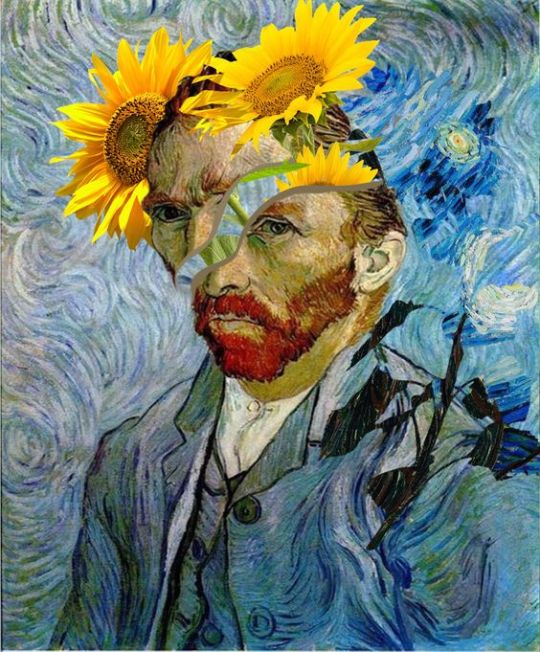
667 notes
·
View notes
Text
216 notes
·
View notes
Text
He was so real for this
#tiktok#ai generated#art#squidward#lana rel rey#whyyy do I kinda want a full version tho lol#music#funny
731 notes
·
View notes
Text
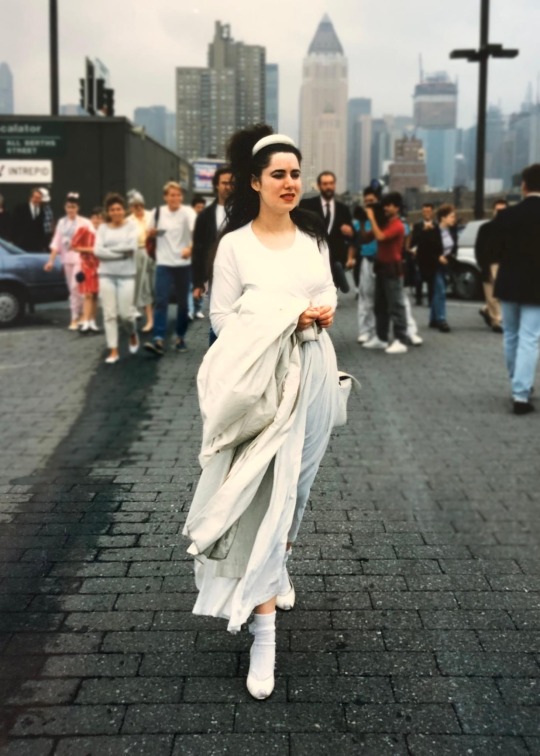

LOVELY 1989 NYC photos by Jeff Harrow (on Facebook)
#I thought the first pic was generated by ai#the cure#robert smith#mary poole#mary smith#music#alternative rock#gothic rock#new wave#post punk#80s music#1989#FAV
529 notes
·
View notes
Text
youtube
🎶 "In My Heart" - An AI-Crafted Love Song | Lyrics by Upul Udayaraj Jayasinghe 🌸💖 ✨ Welcome to a mesmerizing journey of love and emotions with the song "In My Heart." This enchanting melody, crafted with lyrics by Upul Udayaraj Jayasinghe and music generated by AI, brings together the beauty of human creativity and the power of artificial intelligence. 🌟 🎤 Song Breakdown: Verse 1: Takes you into a world where memories and love are crystal clear, where affection fills every moment. 💫 Chorus: A reminder that love is ever-present, free like the wind, guiding you through the darkest nights and brightest mornings. 🌙🌞 Verse 2: A call to closeness, with love being the constant companion in life’s journey, even across distances. 🌊💑 Bridge: A poetic reflection of how love was destined, carried by fate like a star shining through the skies. 🌠 Verse 3: Through life’s storms and challenges, love stands as a beacon of hope, always true and unwavering. 🌹🌧️ 🎶 This heartfelt love song captures the essence of deep connection, devotion, and the beauty of eternal love. With delicate verses and a soothing melody, "In My Heart" is sure to tug at your heartstrings. Whether you’re reflecting on a love that transcends time and space or simply looking for a song that speaks to the soul, this is for you. 🌺✨ 🔔 Don’t forget to like, comment, and subscribe to stay updated with more AI-powered musical creations and lyrical wonders from Upul Udayaraj Jayasinghe!
#AI-generated music#love song#romantic music#emotional song#lyrics by Upul Udayaraj Jayasinghe#AI music#love lyrics#soulful music#AI-powered song#new AI music#heartfelt lyrics#in my heart song#love melody#emotional lyrics#2024 love song#music by AI#love song lyrics#artificial intelligence music#music creation AI#AI love song#Upul Udayaraj Jayasinghe#ai music#ai music video#artificial intelligence#@365life6#Youtube
1 note
·
View note
Text
AI is out of control..
#dank memes#funny post#meme#dank#funny#funny pics#silly#funny pictures#dankest memes#humor#ai#ai art#ai generated#ai video#video post#music video
81 notes
·
View notes
Photo
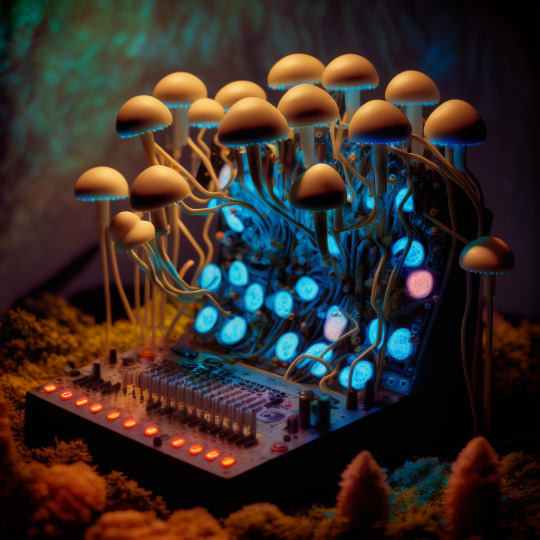
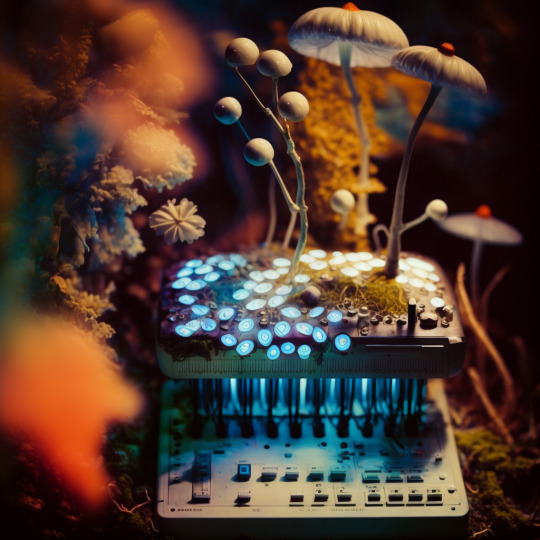
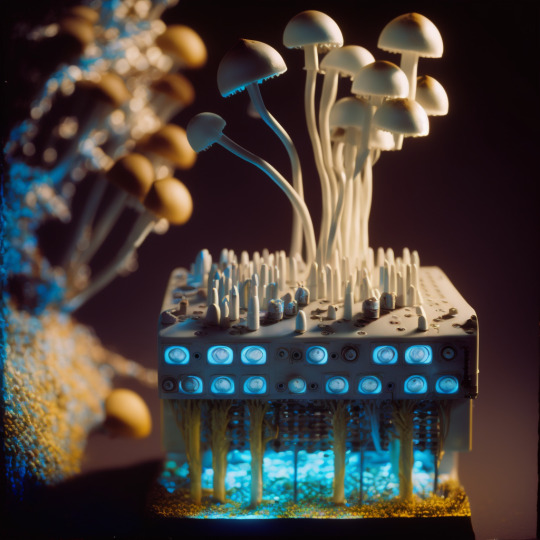
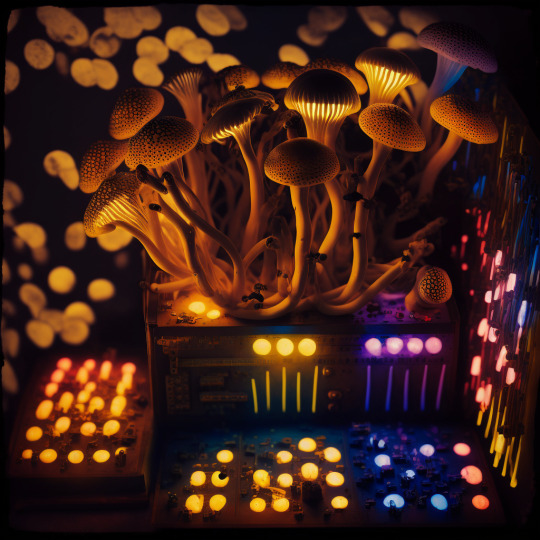
modular mycosynthesis
#modular synth#music#ai gen stuffs#mixed models#electronic music#generative#design#ideas#visions#glow#lights#color#synth#experimental#hybrid#experimental music#mushrooms#mycelium#fungi#colorful#a e s t h e t i c#aesthetic#mood#nature lovers#nature#symbiosis#connections#synchronicity
2K notes
·
View notes
Text
#video#view#paradise#nature#paraiso#natureza#explore#travel#trip#pink trees#china#asia#korea#ai generated#old architecture#fall#autumn#music#cozy#landscape#travel destinations#japan#woods#forest
179 notes
·
View notes
Text
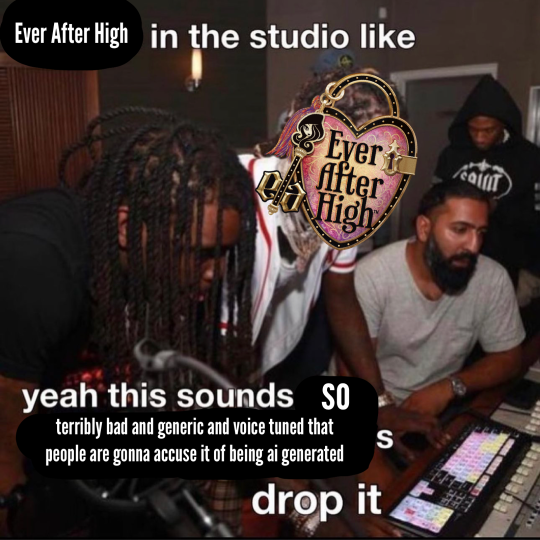
What is going onnnnn
#sid rants#ever after high#i genuinely don’t THINK it’s ai generated#be it the lyrics or the voices or the music#(destiny was really pushing it though)#because in the end their market is young girls who don’t need AMAZING music or complicated lyrics to enjoy it#but it still just sounds SO bad
298 notes
·
View notes